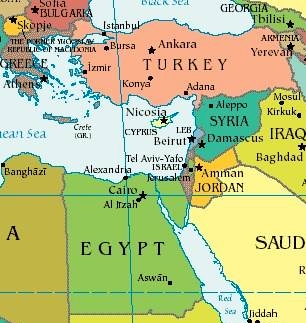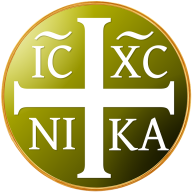 This article and the one following will attempt to outline in brief a framework for the systematic comparison of Orthodox and Islamic theology. I hope to develop this framework in future writings in a much fuller fashion, given the importance that I believe it could have for future Orthodox-Islamic relationships. These relations are deeply historically grounded, but also deeply politicized by reductive nationalisms in the modern period.
This article and the one following will attempt to outline in brief a framework for the systematic comparison of Orthodox and Islamic theology. I hope to develop this framework in future writings in a much fuller fashion, given the importance that I believe it could have for future Orthodox-Islamic relationships. These relations are deeply historically grounded, but also deeply politicized by reductive nationalisms in the modern period.
Scope and Method
Comparing all of Islam to Orthodox Christianity would be difficult and imprecise, since Islam is as internally diverse as Christianity. It thus makes more sense to compare one particular Islamic tradition with one particular Christian tradition. I will therefore compare the theological history of Orthodox Christianity with that of Sunni Islam in the Eastern Mediterranean—roughly contemporary Turkey, Egypt, Lebanon, Jordan, Syria, and Palestine. Sunni Islam in the Eastern Mediterranean comprises most of the former Ottoman Empire, which gives it a shared intellectual and cultural heritage in much the same way that the Orthodox world has.
Secondly, I will restrict my comparison to dogmatic theology, or theology that represents core beliefs about God and the spiritual life in each tradition. I will argue in this piece that Orthodox and Sunni Islam in the Eastern Mediterranean exhibit a strikingly similar pattern of theological history, but in fact come to almost diametrically opposed conclusions about theological epistemology, i.e., how to know and approach God.
Similarity: Theological History
Both Orthodoxy and Sunni Islam in the Eastern Mediterranean consolidated their authoritative system of dogmatic theology in the 14th century. As is well known, Byzantine theology reached its final stage of patristic development with St. Gregory Palamas (1296-1359), archbishop of Thessaloniki. His theological epistemology and soteriology received official conciliar and imperial sanction in Constantinople in 1351. ‘Adud al-Din al-Iji (ca. 1300-1355), a highly regarded scholar and judge, was an exact contemporary of Palamas who spent much of his life in Shiraz in present-day Iran. His systematic theology would later be adopted by the Ottoman madrasah (seminary) system as the basis of Islamic dogmatic theology taught throughout the empire, i.e., throughout the Eastern Mediterranean region.
In both the Ottoman and Byzantine empires, the emperor (sultan or basileus) exercised dominion alike over the administrative state and the religious hierarchy. In both cases, the emperor was believed to have been empowered by God to rule in the name of the one true faith, and was therefore ultimately responsible for upholding the power of that faith within the empire. In both Byzantium and the Ottoman Empire, the religious establishment was supported by the imperial government and constituted a parallel hierarchy of power that provided the imperial government with sacred legitimacy. In other words, these two theological traditions reached the peak of their classical development under very similar political and social frameworks.
Difference: Theological Epistemology
In contrast with their institutional forms, the content of these theologies was strikingly different. They reached almost diametrically opposed conclusions on how human beings come to know God, and how to define the content of the spiritual life. On the one hand, Palamas’ hesychastic theology argued that true knowledge of God could only be obtained through self-purification and participation in the sacramental life of the Church, leading to a direct experience of God through the grace of His deifiying energies. Palamas looked at rational and empirical investigation with suspicion, and counseled that while these methods may be useful in secular contexts, they are best avoided in theology, the proper content of which is the result of mystical experience based on spiritual growth. Palamas sees a scriptural basis for his viewpoint in 1 Cor 1:26, calling those who use such “pagan” methods “wise by human standards” (NRSV; literally, “wise according to the flesh”).
On the contrary, Iji argued that rational investigation of God’s nature, based on empirical observations made by human senses, is the very foundation of the knowledge of God and the religious practice of Islam. According to Iji, human reason demonstrates the honor placed on humanity by God, and this faculty operates by organizing information taken in by empirical data. Furthermore, Iji sees mystical knowledge not as superior to, or in competition with, rational and empirical investigation; rather, he argues that they are complementary paths leading to the same goal. Iji cites Islamic revelation, the Qur’an, in support of this view, in which God commands human beings to reflect on the world around them: “Observe that which is in the heavens and in the earth” (Surat Yunus: 101: Study Qur’an translation).
Palamas describes the relationship between theology and spiritual ascent this way:
But purity of the passionate part of the soul effectively liberates the mind from all things through impassibility, and unites it in prayer to the grace of the Spirit; and through this grace the mind comes to enjoy the divine effulgence and acquires an angelic and godlike form (from the Triads, trans. Gendle, 37).
Compare this with Iji, who describes rational and mystical knowledge as complementary, where the former is the necessary basis of the latter:
[God] has honored humankind with exalted reason and rationally necessary knowledge, and He has made them capable of rational speculation and evidential investigation, in addition to the ascent through the stages of mystical perfection. He therefore has commanded them to contemplate His creations and to reflect on His works, so that He might lead them to knowledge of His existence (al-Mawaqif, ed. ‘Alam al-Kutub, p. 2, my translation).
Both Palamas’ and Iji’s ideas represented the mainstream of their respective theological traditions: Byzantine hesychastic thought on the one hand, and Sunni Islamic scholastic theology (‘Ilm al-Kalam) on the other.
As I hope to explain in a subsequent article, Orthodoxy and Sunni Islam in the Eastern Mediterranean region share a parallel path of development in the modern period as well: both of them encountered Western modernity in similarly ambivalent ways, but developed different theological resources to meet this challenge based on the two dogmatic heritages discussed above.
Phil Dorroll holds a PhD in Religion from Emory University. He specializes in the history of Islamic theology in classical Arabic and modern Turkish. He is an Orthodox Christian and professor of religion at Wofford College in Spartansburg SC. His work focuses partly on historical interactions between Orthodoxy and Islam. See our Archives by Author for his previous articles for Orthodoxy in Dialogue on these topics.
Orthodoxy in Dialogue seeks to promote the free exchange of ideas by offering a wide range of perspectives on an unlimited variety of topics. Our decision to publish implies neither our agreement nor disagreement with an author, in whole or in part.
Use our PayPal Button to support our work.
Click here if you would like to join our editorial team.
Check our Letters to the Editors and The Marketplace often.
Click here to participate in an important parish life survey/research project.


Pingback: IN CASE YOU MISSED IT: JULY | ORTHODOXY IN DIALOGUE